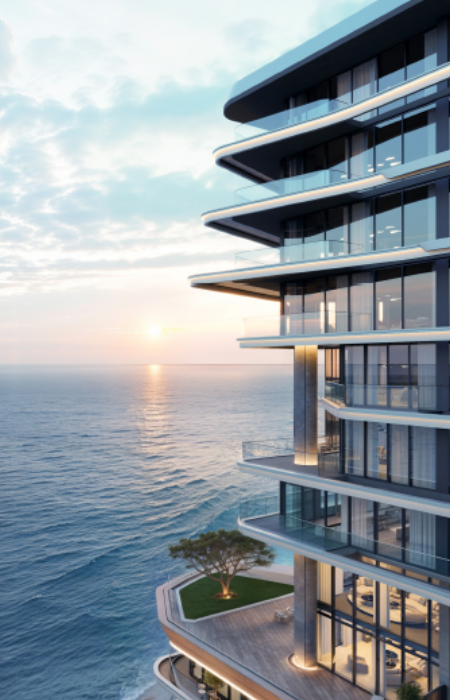Property listings
Access to a wide range of properties available for sale, rent, or investment in Dubai.

.png)
Managing Properties Ethically
.jpeg)

.png)
These testimonials highlight the positive experiences of our diverse clients, demonstrating Odyssey Real Estate's dedication to excellence across all aspects of our real estate services.
Buying a property in the UAE can qualify investors for a resident visa, if certain conditions are met. Investors who buy properties in specified Freehold Zones can apply for a two-year resident visa. Those who plan to finance their purchase with a mortgage, on the other hand, should be prepared to put down at least 50%. The required investment amount varies with the number of property owners. For individual investors, the minimum investment required is AED 750,000. If the property is jointly held by spouses, the minimum investment rises to AED1 million. Furthermore, investors can sponsor their spouse and children under the age of 18 as part of their resident visa application.
Yes, it is possible to buy a property in the UAE without involving a real estate broker. Buyers can directly approach developers or individual sellers to complete the transaction. However, working without a broker means taking full responsibility for understanding the legal procedures, paperwork, and market pricing. While it can save on commission fees, buyers are advised to proceed with caution, conduct thorough due diligence, and consider hiring a legal consultant to ensure a smooth and secure transaction.
Yes, non-residents can buy property in Dubai. You do not need a residence visa to invest in real estate in the UAE. In fact, buying and holding property long-term in Dubai is considered a smart investment, often offering better returns compared to many major cities around the world.
Freelancers, including foreign nationals and non-residents, can legally own property in Dubai by purchasing in designated freehold zones. These areas allow full ownership rights, free from leasehold restrictions, for up to 99 years. This makes it possible for freelancers and international buyers to invest in Dubai’s real estate market even without holding a UAE residency. Title deeds for these properties are officially issued by the Dubai Land Department, and there are no age restrictions for property ownership. Popular freehold zones include Business Bay, Downtown Dubai, Palm Jumeirah, Discovery Gardens, and DIFC. Compared to other emirates, Dubai’s property ownership regulations are more flexible, making it an attractive option for freelancers looking to invest or settle in the city.
Yes, there are certain restrictions on where foreigners can buy property in the UAE. Foreign nationals are allowed to purchase real estate with full ownership rights only in designated freehold zones. Outside these zones, they are generally limited to leasehold agreements, which grant them rights over the property for a fixed period rather than full ownership. In the designated freehold areas, foreigners can own property outright, and in some cases, this ownership may make them eligible for the UAE Golden Visa. Dubai, in particular, offers a wide range of freehold zones where these rules apply. However, before making any property investment, it’s important to consult with legal and tax professionals as well as local authorities to fully understand the applicable regulations and responsibilities.
The property buying process in Dubai stands out from other emirates due to its well-established legal framework, clear regulations for foreign ownership, and streamlined registration system. In Dubai, foreign nationals are allowed to purchase freehold properties in designated zones with full ownership rights. The process includes verifying the property's title deed with the Dubai Land Department (DLD) before registration can be completed under the buyer’s name. Dubai also has a transparent registration system and digital services that make transactions efficient. However, buyers should be prepared for various costs such as transfer fees, registration charges, and ongoing service fees, which can vary depending on the property's type and location. In comparison, other emirates may have more limitations on foreign ownership or follow different rules for property acquisition, especially when it comes to leasehold rights and property use. It's also important to note that Dubai's property laws are more flexible and investor-friendly, particularly for international buyers. To ensure a smooth experience, it is highly recommended to consult legal and tax professionals and check with local authorities before proceeding with any property transaction in the UAE.
Buying property in Dubai offers several attractive benefits for UK citizens. One of the biggest advantages is the opportunity for full ownership in designated freehold areas, allowing buyers to own property outright with no restrictions on nationality. Dubai also offers high rental yields, often exceeding those in major UK cities, making it a smart investment for generating passive income. Another key benefit is tax efficiency—there is no property tax, capital gains tax, or income tax on rental earnings in Dubai, which significantly increases the return on investment. UK citizens can also apply for a residency visa when purchasing property above a certain value, providing long-term access to the UAE for themselves and their family. In addition, Dubai boasts world-class infrastructure, a safe and secure environment, and a growing economy, which continues to attract international businesses and residents. Its strategic location also offers easy connectivity between Europe, Asia, and Africa. All these factors make Dubai a highly appealing destination for UK nationals to invest in property.
Investing in a beachfront property in Dubai offers a unique combination of luxury living, strong returns, and long-term value. These properties are located in some of the city's most prestigious and high-demand areas, such as Palm Jumeirah, Dubai Marina, and Jumeirah Beach Residence, which consistently attract both residents and tourists. As a result, beachfront homes often enjoy high rental income and strong appreciation in value over time. Dubai’s beachfront properties offer not just beautiful views and direct beach access, but also world-class amenities, 5-star facilities, and a resort-style lifestyle—making them highly desirable for end-users and holiday home investors alike. Additionally, many of these developments qualify buyers for the UAE Golden Visa, adding long-term residency benefits to the investment. With no property tax, a safe and well-regulated market, and a booming tourism sector, beachfront properties in Dubai are not just a lifestyle choice—they are a smart, future-ready investment.
Several locations in Dubai are known for offering high rental yields, making them attractive choices for property investors. Areas like Jumeirah Village Circle (JVC), Dubai Silicon Oasis, International City, and Dubai Sports City often deliver rental returns ranging from 6% to 9% annually, depending on the property type and demand. For those looking for affordable entry points with strong rental potential, JVC and International City are popular among young professionals and families. On the other hand, Dubai Marina, Downtown Dubai, and Business Bay attract a premium tenant base and offer slightly lower but stable returns, typically around 5% to 7%, along with high capital appreciation. It's also worth noting that short-term rentals in areas close to the beach or tourist hotspots—such as Palm Jumeirah or JBR—can yield even higher returns, especially during peak seasons. Choosing the right location depends on your investment goals—whether it's steady income, long-term appreciation, or both.
To calculate potential returns on your property investment in Dubai, you mainly need to focus on the rental yield, which shows how much income your property can generate annually compared to its purchase price. Here's a simple formula: Rental Yield (%) = (Annual Rental Income / Property Purchase Price) × 100 For example, if you buy a property for AED 1,000,000 and earn AED 80,000 per year in rent, your rental yield is: (80,000 / 1,000,000) × 100 = 8% Besides rental yield, consider other factors that affect your overall return, such as: Service charges and maintenance costs Vacancy periods Property management fees (if any) Capital appreciation – the increase in property value over time You can also use online investment calculators or consult a real estate expert to get a more accurate estimate, especially if you're comparing multiple properties. Calculating returns helps you make informed decisions and choose the right property based on your investment goals.
With over $1 billion in combined sales, our team remains dedicated to upholding a sense of humility and discretion.
Current Listing Volume
Total Sold 2020 - 2023
Lifetime Sales Volume
Our experts and agents are here to share their insights and help you out today—let’s make it happen!
We will respond as soon as we receive your message.